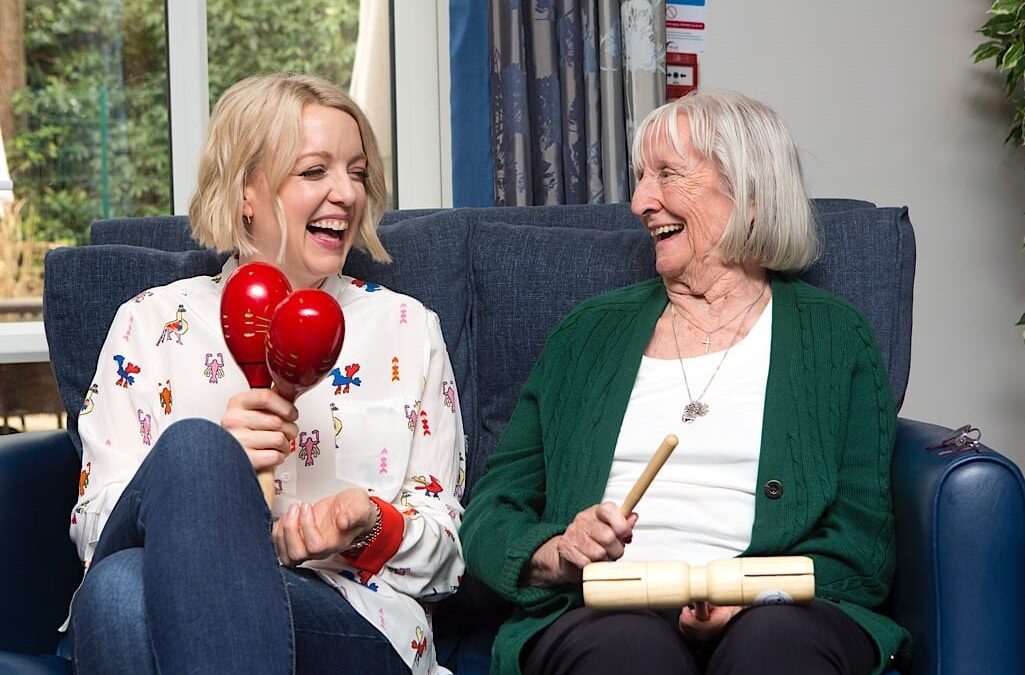- The National Institute for Health and Care Excellence (NICE) has updated its dementia care recommendations to include music therapy
- Music for Dementia launched earlier this year and is campaigning to make music free for people living with dementia
- Currently there are more than 850,000 people living with dementia in the UK who could benefit from music
Thursday 18 July 2019: London, UK. THE decision to include music therapy in NICE’s updated quality standards on dementia will pave the way for thousands of people to benefit from it.
The updated guidance emphasises the need for dementia care to place the individual at the centre of care decisions.
Practitioners are encouraged to offer activities such as music therapy, exercise, aromatherapy, art,gardening, baking, reminiscence therapy, mindfulness and animal assisted therapy “to help promote theirwellbeing”.
NICE also said GPs and other health and social care practitioners should have discussions with dementia patients and their families about their life experiences, preferences and circumstances to find out which activities they can choose from and are available locally.
NICE quality standards draw from NICE guidance and make recommendations describing high-quality care in priority areas to improve.
Lauren Laverne, presenter of BBC Radio 6 Music’s breakfast show and current presenter of the UK’s most-loved radio show*¹ BBC Radio 4’s Desert Island Discs said: “I recently visited a care home and saw first-hand the effect music therapy had on people living with dementia – it is truly amazing. “Whether it’s playing an instrument or listening to the appropriate music – music is such a powerful tool and it’s great that it’s benefits are being recognised.
“We need to celebrate music, but most importantly utilise it where we know it helps. Music for Dementia2020 will continue to fight to make music free for everyone living with dementia.”
Grace Meadows, Programme Director at Music for Dementia 2020 and a senior music therapist at Chelsea and Westminster Hospital, said: “This announcement is incredibly welcomed by Music forDementia and all those that we are working with. It presents us with a wonderful opportunity to further support people living with dementia who could benefit from music therapy, but don’t yet haveaccess to it as part of their dementia care.
“We have seen first-hand the benefits personalised music can have for people living with dementia – even those in the most advanced stages – and urge Clinical Commissioning Groups to act to ensurethat music therapy is offered as part of the care they provide for people living with dementia.”
Professor Gillian Leng, Deputy Chief Executive and Director of Health and Social Care at NICE, said: “People with dementia can find it harder to take part in activities, to engage socially, to maintaintheir independence, to communicate effectively, to feel in control and to care for themselves. Providing enjoyable and health-enhancing activities like music or reminiscence therapy can help with this.
“Understanding the activities that a person prefers, and thinks are suitable and helpful, and adaptingthem to their strengths and needs, will make a person more likely to engage with the activities offeredand therefore more likely to benefit from them.”
The campaign is also backed by Health and Social Care Secretary Matt Hancock who said: “As a society there’s so much more we can do to help people live well with dementia.
“Whether it’s joining a choir, gardening or enjoying art classes, so many activities can help people live better and can trigger precious memories and help reconnect them with their communities.
“So I wholeheartedly endorse this quality standard, which supports the ambitions of our NHS Long Term Plan and its move to a more personalised and person-centred care.”
Music for Dementia is a nationwide campaign backed by The Utley Foundation, a charity founded in 2014 by Neil and Nicky Utley. Neil Utley said: “Making music free for people living with dementia is the key ask for our campaign. The recommendation from NICE represents a major step forward and serves as further evidence that music needs to be embedded in dementia care. We welcome therecommendation.”
There are currently over 850,000 people living with dementia in the UK – supported by 700,000 informal carers who also require help.
The Music for Dementia campaign is seeking to build the UK’s first network for music and dementiaprogrammes, support carers and look at how to improve the quality of life for people living with dementia, by making music readily available and accessible for all.
Visit / for more information, to sign up to the Music for Dementia newsletter and to become part of the taskforce.
______________________________
*¹According to a 2019 poll by Radio Times
______________________________
Notes for Editors
About Music for Dementia
Music for Dementia was launched in January 2019, following research published last year by the International Longevity Centre (ILC-UK), the UK’s specialist think tank on the impact of longevity onsociety and The Utley Foundation. The campaign also seeks to work closely with other dementia groups and charities to act as an umbrella organisation for music and dementia. The Utley Foundation’s funding for Music for Dementia will act as a catalyst to create local and national projects, from understanding how to create the right environments in care settings, through to the use of radio, participation in music making, building playlists, listening to performances and music therapy – with the aim of using music to enhance care pathways. It will look to mobilise government and the entire music industry to become active participants in our 2020 vision.
About The Utley Foundation
The Utley Foundation was founded in 2014 by Neil and Nicky Utley. The Foundation exists to advance social causes and to act as a catalyst for greater funding and wider action for the causes it supports. Music is a personal passion of the founders and trustees and underpins many of the key funding areas of interest to the foundation. The trust has other charitable objectives including Armed Forces Veterans, Children and Overseas Aid.

